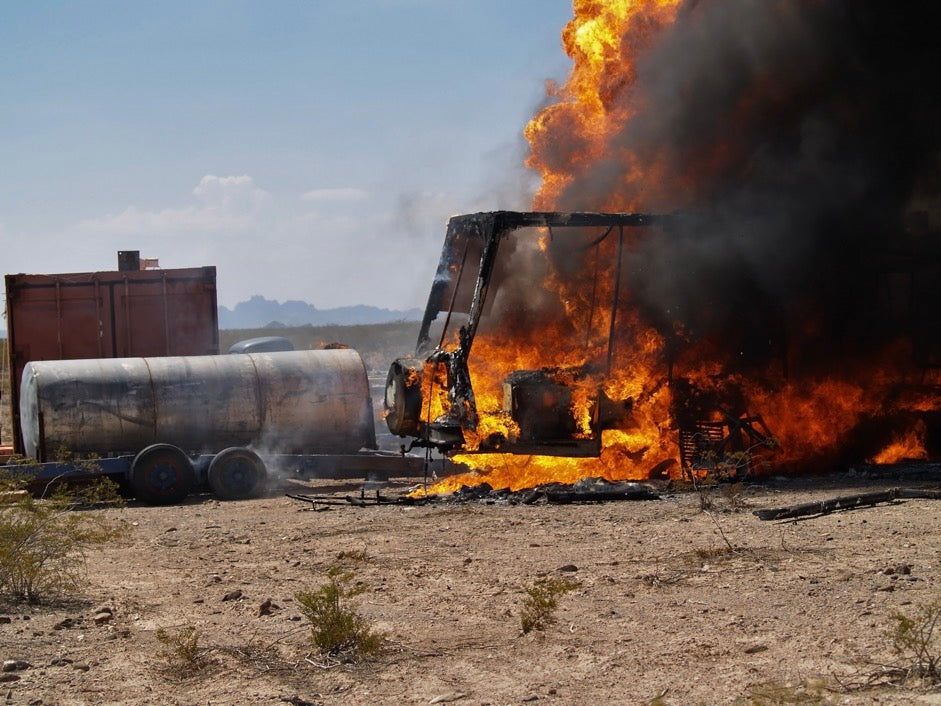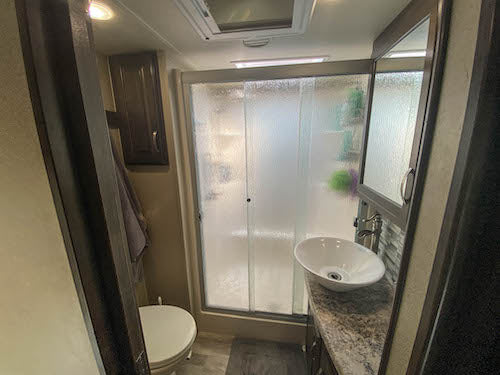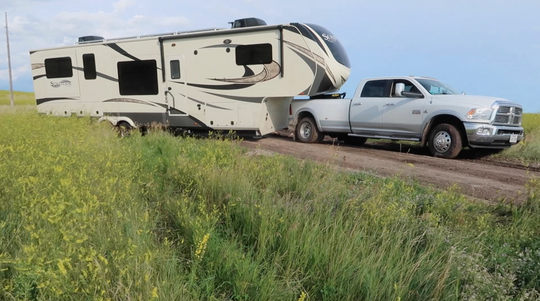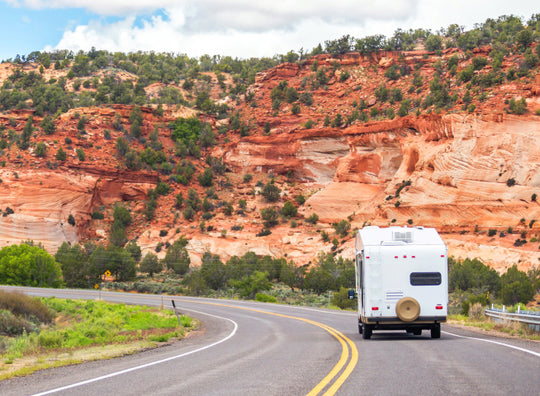We’re sure we’re not alone in saying the only fire you want at your campsite is the one in the firepit. The National Fire Protection Association estimates there are 20,000 RV fires each year. An RV fire was something we were pretty scared of when we first hit the road. We learned that the best way to prevent a fire is to prepare ahead of time. In this article, we will review some common practices and preventative measures you should partake in to avoid an RV fire.

Common Causes of RV Fires
There are several common causes when it comes to RV fires. Let’s take a look so you can avoid a dangerous situation.
Engine Fires
Engine fires are one of the most common RV fires. These fires are caused by fuel and other fluids leaking when the engine heats up. An engine compartment is a mixture of hot moving parts and electrical connections and is a perfect storm for a potential fire. Leaking fluids, loose hoses, and insecure clamps in the engine compartment should always be addressed before traveling. A proper pre-trip inspection can help prevent many engine fires.
Flat Tires
A flat tire is not only an incredible inconvenience but also incredibly dangerous. Additionally, your tire doesn’t have to be flat to be dangerous. Under-inflated tires are equally as risky as flat tires. A flat or under-inflated tire increases friction with the road, especially during interstate driving. Friction creates heat, which can cause fires.

You must check your RV’s tire pressure and inspect for any issues before each trip. A tire pressure monitoring system (TPMS) connected to your tires is another excellent tool to have. These systems are expensive but will alert the driver to changes in tire pressure. These systems also alert when the tire’s temperature reaches a specific limit. A tire pressure monitoring system won’t prevent you from experiencing a flat, but it will alert you as soon as possible to help you immediately pull over.
Overheated Brakes
If you’ve ever driven through the mountains, you’ve most likely seen pull-offs for overheating or failed brakes on the side of the road. Going down lengthy hills or mountain passes can do a number on your brakes. Constantly applying your brakes to control your speed is one of the leading causes of brake failure and dangerous fires. Downshifting into a lower gear when going downhill and utilizing emergency pull-outs are great ways to avoid potentially dangerous situations.
Faulty Wiring
If you’ve ever peeked behind a cabinet or wall in your RV, you’ve probably seen the mess of wiring that is hidden away. Faulty wiring is incredibly dangerous. RV manufacturers do their due diligence to ensure proper wires are used and that connections are solid. RVs travel down the roads and are constantly bouncing around. Wires that were once in place can become loose and rub together. When wires continually rub together or against other objects it causes frays in the wiring, which can eventually lead to a fire. Considering many RVs can burn to the ground in 10 minutes, inspecting wires and connections is incredibly important.
RV Refrigerator
You may wonder how an RV refrigerator could cause a devastating fire, but a quick Google search of “RV Refrigerator Fire” will open your eyes. There are reports of seams in cooling units developing cracks and releasing flammable gasses. By the time smoke detectors go off or an RVer smells the burning material, it’s too late.
Every second in an RV fire is crucial, and these fires often leave nothing but ashes behind. What’s even scarier is how the brands experiencing fires are some of the most well-known brands used in the RV industry.
Propane Leaks
Did you know propane is an odorless gas, but the foul smell is an additive to help identify leaks? Propane is highly flammable, and leaks can be hazardous. Propane doesn’t necessarily cause a fire but a dangerous and destructive explosion. Every RVer should verify their RV has a working carbon monoxide detector. As propane is a heavy gas, this detector should be mounted in a low spot near gas stoves and furnaces.

Animal and Insect Nests
It’s not uncommon for RVers to discover they’re not the only ones sleeping in their RV. Animals and insects often build nests in exhaust pipes, appliances, and even in your walls. They’ll use whatever materials they can to build nests. These nests can be extremely dangerous when they’re made near pipes and appliances that generate large amounts of heat. These fires can quickly get out of hand, destroying not only your RV but also the critter’s nest.
Tips for Preventing an RV Fire
Have Any New or New-To-You RV Professionally Inspected
Hiring a professional RV inspector is expensive, but they’ll catch things that are easy to overlook that could cost a fortune down the road. These inspectors will test electrical connections, propane systems and ensure the RV is in safe working order. There are stories of RVers catching major issues by having an independent inspector take a look at a brand new unit they were getting ready to purchase from a dealer. You want to catch these situations before you sign on the dotted line and the issue officially becomes your problem.
Keep Up With Maintenance
We can’t understate the importance of keeping up with our maintenance. Regularly inspecting your RV is the best way to notice damages or issues before they get out of hand. If an appliance or your propane system is making a weird noise, have it looked at immediately. Don’t delay or overlook an issue, hoping it will fix itself.
You should also regularly inspect animal and insect nests, especially if you sit stationary for weeks or months at a time. You’ll want to keep your engine and other components clean of fuel, oil spills, or build-up of different materials.
Be sure you’re regularly changing your engine oil and inspecting your tires as well. These are two tasks that are easy to overlook or put off. Don’t let routine maintenance derail your adventuring!
Always Check Tires
You should check your tires before every trip, and every time you stop. You never know when you’ll pick up a nail, or something will break and knock things out of alignment. Tires out of alignment can quickly wear down incorrectly. When tires wear down quickly, they have the potential to cause dangerous blowouts causing damage to your RV and have the potential to start an RV fire.
Invest In a TPMS and Temperature Sensor for Your Tires
Checking your tire pressure and tire condition before each trip and at each stop isn’t enough. Having the ability to monitor the pressure and temperature of your tires can help you avoid an issue down the road. Quality tire pressure monitoring systems will cost several hundred dollars but are much cheaper than the cost of repairing an RV after a devastating blowout or fire. Some systems can send alerts to your phone or integrate with your tow vehicle’s computer system. We recommend every RVer own a TPMS for their RV!
Always Keep Refrigerator Level
Many RV refrigerators utilize propane to keep them cool. These refrigerators perform best when they’re as level as possible, and many manufacturers recommend being within 3 degrees of level when using the fridge. When un-level, these refrigerators must work hard, which generates more heat and increases the potential for a fire. Keeping your RV level is not just for your comfort, but your refrigerator’s as well!
Don’t Travel With Propane On
We stated that many refrigerators utilize propane to keep them cool, but you shouldn’t travel with your propane on. In some locations, it is illegal for propane to be on while traveling. Your fridge will act as a cooler and stay cold for hours if it is kept shut. Unfortunately, if your propane is on and you experience an accident, you can quickly have a much worse situation on your hands if your propane supply is compromised and leaks.
Don’t Use Power Strips or Extension Cords
When you fill-up power strips or extension cords, you have the potential for pushing your electrical wiring to its limits. This is an issue in RVs, but also in residential homes as well. Overextending your electrical wiring generates heat, which increases the likelihood of a fire. It is best to use power strips or extension cords sparingly as it is easy to get overload wiring without realizing it.

Use Space Heaters Safely and Only Under Supervision
If you’ve ever been in your RV when the temperatures drop, you know it’s easy to plug in a space heater to heat the space quickly. Space heaters use an incredible amount of power, and drawing too much power from your RVs electrical wiring is incredibly dangerous. These devices can not only heat your RV but its wiring as well. By the time you smell the overheating wiring, it’s too late. You shouldn’t overuse space heaters and only use them while you are there to supervise their performance. You should never leave a space heater running if you are not in your RV or supervising it.
Other RV Fire Safety Tips
Let’s take a look at a few more RV fire safety tips that can help keep you and your RV safe!
Use Smoke Alarms and Regularly Test Them
Like in a typical residential home, you should have smoke alarms in your RV and test them regularly. If you cook regularly in your RV, you’ll know if your smoke alarms are working or not, as they often will annoyingly go off. It may be tempting to take the battery out to avoid this annoyance, but they’re there to keep you safe. As annoying as they may be at the time, let them do their job and potentially save your life.
Keep Fire Extinguishers Nearby
Did you know it is a requirement in many states when buying an RV from a dealership that it comes with a fire extinguisher? These are tools that can save not only you but your RV as well. Knowing how to use your fire extinguisher should you need to use it is crucial as well. We know many RVers who have multiple fire extinguishers in not only the inside of their RV but also the outside storage compartments and even in their tow vehicles. You’ll never regret having a fire extinguisher should you need to use it.
Have An Escape Plan
There are usually several emergency exits in RVs. These are often in bedroom windows and the main entrance/exit. You’ll want to discuss with your family what the plan would be should a fire occur just as you would in a home. Have a plan for where you’ll meet and how children should attempt to escape. It’s even a great idea to have a fire drill with your family to practice exiting the RV as quickly and efficiently as possible. This is a great time to verify all emergency exits are in working order, and fire extinguishers are functioning.
It’s Better To Be Overprepared
We would rather RVers be over-prepared than underprepared should they find themselves in an emergency. RV fires are serious business and can be incredibly destructive and potentially deadly. Taking precautions now can help keep your family as safe as possible while RVing. Now, comes the most important question: does your family have an RV fire plan in place?











